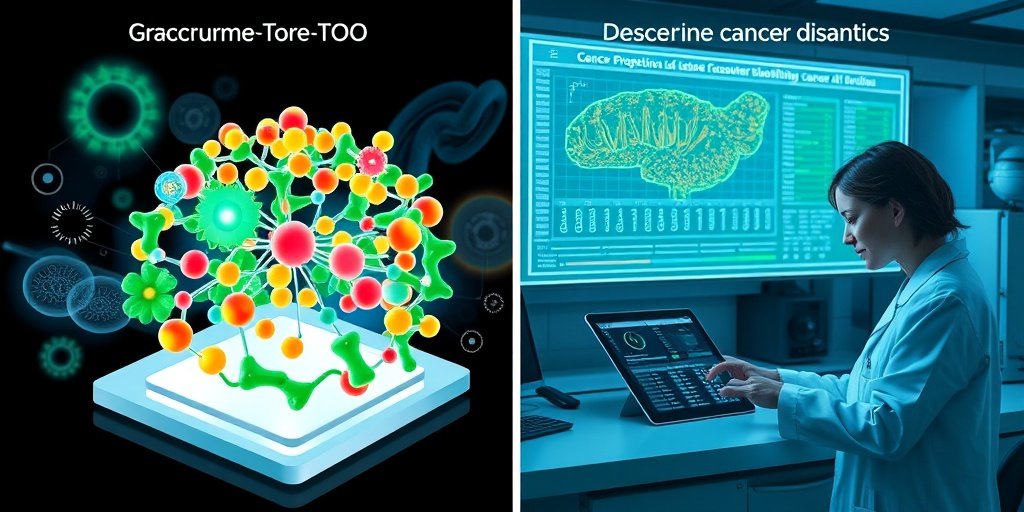⚡ Quick Summary
The study introduces OncoTrace-TOO, a novel machine learning framework designed for the identification of cancer tissue-of-origin using transcriptomic signatures. This framework achieved an impressive accuracy of 0.967 and offers biologically interpretable predictions, enhancing clinical decision-making in cancer diagnostics. 🎉
🔍 Key Details
- 📊 Dataset: Utilized TCGA and GEO validation datasets
- 🧬 Features used: Gene expression profiles
- ⚙️ Technology: Logistic regression for classification
- 🏆 Performance: Overall accuracy of 0.967, with perfect classification for seven cancer types
🔑 Key Takeaways
- 🔍 OncoTrace-TOO provides a transparent and interpretable approach to cancer diagnostics.
- 💡 High accuracy of 0.967 demonstrates its effectiveness in classifying diverse cancer types.
- 🏆 Perfect classification achieved for seven cancer types, including CHOL, DLBC, and LAML.
- 📈 Robust performance in both primary and metastatic cancers.
- 🧬 Biologically interpretable predictions reveal tumor-specific molecular signatures.
- 🌍 Clinical applicability is enhanced, supporting personalized treatment strategies.
- 🔬 Validation on independent clinical tumor samples achieved an accuracy of 0.857.

📚 Background
The challenge of diagnosing cancer of unknown primary remains significant in oncology, as it complicates the selection of targeted therapies. Traditional methods often struggle to differentiate between biologically similar tumors, leading to a pressing need for innovative solutions. The integration of machine learning with transcriptomic data presents a promising avenue for improving diagnostic accuracy and treatment personalization.
🗒️ Study
The research team developed the OncoTrace-TOO framework, focusing on classifying tissue-of-origin across various cancer types. By leveraging gene expression profiles and employing a one-vs-rest differential expression analysis, the model was designed to enhance the interpretability of machine learning predictions, making it a valuable tool for clinicians.
📈 Results
The OncoTrace-TOO model achieved a remarkable overall accuracy of 0.967, with perfect classification for seven distinct cancer types. Its predictive accuracy was validated across multiple datasets, demonstrating a strong capability to differentiate between histologically related malignancies and classify rare cancer subtypes. Furthermore, when tested on independent clinical samples, the model maintained a commendable accuracy of 0.857.
🌍 Impact and Implications
The implications of the OncoTrace-TOO framework are profound. By providing high predictive accuracy and biologically meaningful insights, this model not only enhances diagnostic precision but also supports personalized treatment strategies in complex cancer cases. The potential for improved patient outcomes through more accurate tissue-of-origin identification is a significant advancement in the field of oncology. 🌟
🔮 Conclusion
The development of OncoTrace-TOO marks a significant step forward in cancer diagnostics. Its ability to deliver accurate, interpretable predictions based on transcriptomic signatures holds promise for transforming clinical practices and improving patient care. As we continue to explore the integration of machine learning in healthcare, the future looks bright for personalized cancer treatment strategies. 🌈
💬 Your comments
What are your thoughts on the advancements in cancer diagnostics through machine learning? We would love to hear your insights! 💬 Join the conversation in the comments below or connect with us on social media:
OncoTrace-TOO: Interpretable Machine Learning Framework for Cancer Tissue-of-Origin Identification Using Transcriptomic Signatures.
Abstract
BACKGROUND: Cancer of unknown primary remains a formidable diagnostic challenge due to the inability to pinpoint the primary tumor site, which restricts the use of targeted therapeutics. Although machine-learning methods that integrate transcriptomic approaches have provided valuable insights into tumor origins, they often face challenges in distinguishing biologically similar tumors and typically lack biological interpretability.
AIMS: This study aims to develop a transparent and biologically interpretable machine learning framework to accurately classify tissue-of-origin across diverse cancer types, thereby facilitation clinical diagnosis.
METHODS: We designed OncoTrace-TOO, a novel tissue-of-origin classification model based on gene expression profiles. The model utilizes pan-cancer discriminative molecular features identified through one-vs-rest differential expression analysis and applies logistic regression as the classification algorithm.
RESULTS: OncoTrace-TOO achieved an overall accuracy of 0.967, with perfect classification for seven cancer types (e.g., CHOL, DLBC, and LAML). The model demonstrated high predictive accuracy in both primary and metastatic cancers across TCGA and GEO validation datasets, with enhanced capability in resolving histologically related malignancies as well as classifying rare cancer subtypes. When applied to independent clinical tumor samples, the model achieved TOO prediction accuracies of 0.857, further validating its robustness. Importantly, the framework offers biologically interpretable predictions by revealing tumor-specific molecular signatures, thus enhancing its clinical applicability.
CONCLUSIONS: OncoTrace-TOO not only offers high predictive accuracy for tissue-of-origin classification, but also delivers biologically meaningful insights that support clinical decision-making. This framework holds promise for improving diagnostic precision and guiding personalized treatment in challenging cancer cases.
Author: [‘Hao Y’, ‘Huang H’, ‘Huang D’, ‘Ruan J’, ‘Liu X’, ‘Zhang J’]
Journal: Cancer Rep (Hoboken)
Citation: Hao Y, et al. OncoTrace-TOO: Interpretable Machine Learning Framework for Cancer Tissue-of-Origin Identification Using Transcriptomic Signatures. OncoTrace-TOO: Interpretable Machine Learning Framework for Cancer Tissue-of-Origin Identification Using Transcriptomic Signatures. 2025; 8:e70311. doi: 10.1002/cnr2.70311